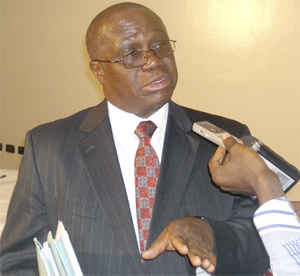Total revenue and grants (excluding exemptions) amounted to GH¢16.1 billion (22.3 percent of GDP) in 2012 as against a budget estimate of GH¢16.9 billion.
Provisional estimates of the broad fiscal data for 2012 released by the Monetary Policy Committee of the Bank of Ghana indicate that tax revenue amounted to GH¢11.6 billion, about 3.7 percent lower than the budget target of GH¢12.1 billion.
“The shortfall in tax revenues was mainly on account of lower company taxes, especially from oil companies. Grants totaled GH¢1.2 billion, falling short of the budget estimate of GH¢1.5 billion.
“Non-tax revenue was GH¢2.2 billion, below the budget estimate of GH¢2.8 billion. This was explained by the non-realization of proceeds from mining companies as the intended review of the stability agreements stalled during the year.”
Henry Kofi Wampah, Acting Governor of BoG, who disclosed this, said total expenditures, including arrears clearance and commitments amounted to GH¢24.8 billion (34.5% of GDP) in 2012.
The outturn was 7 percent higher than the budget target.
The high expenditure growth was due to increased recurrent spending amounting to GH¢16.5 billion, 26.5 percent more than the budget.
This was driven by higher payments in respect of personal emoluments, utility and fuel subsidies and interest costs.
“In 2012, wages and salaries was GH¢7.5 billion against a target of GH¢5.6 billion. This was largely on account of the implementation of the single spine pay policy. Capital expenditures totaled GH¢4.6 billion, seven percent lower than the target.
“These developments in the fiscal operations resulted in a deficit of GH¢8.7 billion (12.1 percent of GDP) against a target of GH¢4.7 billion (6.7 percent of GDP).”
The higher-than-budgeted fiscal deficit was explained mainly by a shortfall in corporate income taxes of GH¢708.2 million (1.0 percent of GDP); excess payments in respect of the Single Spine Salary Structure of GH¢1.9 billion (2.7 percent of GDP), higher interest cost of GH¢245 million (0.3 percent of GDP) and high utility and fuel subsidies of GH¢339 million, representing 0.5 percent of GDP.
The deficit was financed mainly from domestic sources.
Net domestic financing accounted for GH¢7.1 billion of which BoG financed was 31 percent while foreign financing was GH¢1.6 billion.
Also, Dr Wampah mentioned that the stock of total public debt stood at GH¢33.5 billion (46.7 percent of GDP) in 2012 compared to GH¢24.0 billion (42.6 percent of GDP) in 2011.
The stock of domestic debt was GH¢18.5 billion in 2012 compared to GH¢11.8 billion in 2011 while the external debt amounted to US$8.0 billion compared to US$7.8 billion during the corresponding periods.
Business News of Friday, 15 February 2013
Source: Daily Guide

















